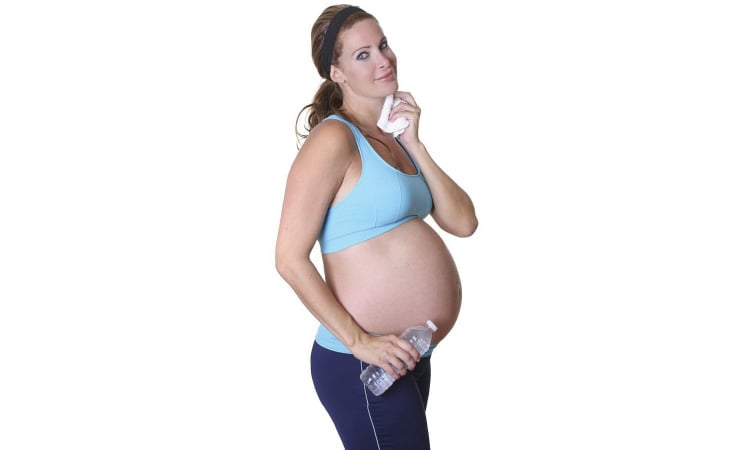A woman’s body undergoes significant changes during pregnancy. These changes affect her daily life in many ways. Excessive sweating is one of these physical changes that a pregnant woman is likely to experience. The majority of pregnant women experience flushing, and hot flashes, and end up waking up drenched in sweat while they are sleeping. Sweating during pregnancy can be inconvenient, uncomfortable, and even embarrassing. While increased sweating is a normal part of pregnancy, it should never be regarded as a cause for concern.
How Common Is Sweating During Pregnancy?
Pregnancy is a time when women tend to sweat more than usual. It is estimated that 35 percent of women experience hot flashes during pregnancy. Hot flashes can cause sweating that can range from mild to excessive. 29% of pregnant women who experience excessive sweating during pregnancy also experience it in the postpartum period1.
What Causes Sweating During Pregnancy?
Sweating is nature’s way of regulating our body temperature. While you are pregnant, your body temperature slightly increases. The slight increase in body temperature is a natural consequence of the process of growing a baby in the womb. In addition to hormonal changes and an increase in blood volume, weight gain also contributes to this slight increase in temperature.
The following are the top 10 causes of sweating during pregnancy:
1. Fluctuating hormone levels
Certain hormones control your body temperature, so excessive sweating may be caused by hormonal imbalances. The two most important hormones released by the body during pregnancy are progesterone and estrogen. During times of fluctuating hormone levels, the body temperature may rise and as a result, there may be an increase in perspiration2.
Related Reading: 11 Things You Can Do When Pregnant And Can’t Sleep At Night
2. Increased blood circulation
A pregnant woman’s blood volume increases considerably. In fact, it continues to rise to 50 percent (or more) towards the end of the third trimester. The increased blood flow can make you feel warmer. Your blood vessels dilate during pregnancy to carry more blood. Thus the blood vessels carry more blood to your skin’s surface. This increases sweating3.
3. Increased metabolic rate

As the body prepares to fuel and take care of another living being during pregnancy, it can put the body in a completely different gear. In most cases, the growing fetus will require more energy and resources, which boosts the metabolism of the woman. As the pregnancy progresses, the growing fetus requires more energy, which means the metabolic rate will also increase. During pregnancy, the body of a pregnant woman burns more calories and generates more heat, so she sweats a lot
Calculate Due Date With LMP
4. Excessive weight gain
The weight of pregnant women increases as the pregnancy progresses. Excess weight gain during pregnancy can lead to increased sweating as a result. When fat is present in our bodies, it acts as insulation, raising our core temperature. Furthermore, as the core body temperature rises, their body has to sweat more in order to cool itself down. With a heavier body, moving around is more difficult, and the pregnant woman has to exert more energy, which generates heat internally. The bigger a pregnant woman is, the more heat her body produces and the more likely she is to sweat excessively.
Related Reading: 12 Tips To Maintain Weight During Pregnancy
5. Medical conditions and medication
Fever caused by the common cold, flu, or other infections can also increase body temperature, which makes pregnant women sweat more than usual. Some medications can also make pregnant women sweat more. Medicines for nausea are included in this category, which some pregnant women take to fight morning sickness.
6. Environmental conditions
Sweating enables you to stay cool by evaporating water from your skin, thereby keeping us from overheating. Temperature, humidity, and solar radiation are some of the environmental factors that affect sweating.
- You will sweat more when the climate is hot. When the weather is cooler, you will sweat less
- Like temperature, the higher the humidity, the more you will sweat. The drier the environment, the less sweat you will experience. Perspiration evaporates more slowly in humid conditions. This results in sweat soaking into your clothes or dripping down your body
- The term solar radiation refers to sunlight directly hitting you when you are outside. Solar radiation makes you feel warmer and makes you sweat more. The sun’s direct rays and the surrounding environment contribute to this solar radiation
As a result, pregnant women tend to sweat a lot when the weather is hot and humid, as well as when they spend time outdoors when the sun is strong.
7. Physical activity
Sweating occurs when the body gets hot, either externally due to high temperatures and humidity or internally as a result of muscle activities during physical exertion. Three factors that contribute to people sweating more when they exercise are:
- Exertion level
- Clothing
- Temperature indoors or outdoors.
During their pregnancy, women tend to sweat more than usual when they exercise, clean the house, go for a walk, or do any activity that puts strain on their bodies.
Related Reading: 8 Benefits Of Exercising During Pregnancy
8. Anxiety
The sweat glands are stimulated by nerves that are sensitive to stress, emotions, hormones, and other factors. When anxiety takes hold, the body temperature rises, which stimulates sweat glands. As a result, pregnant women may experience excessive sweating when they are having anxiety or mood swings. Early pregnancy anxiety can be dealt with these easy tips.
9. Hyperthyroidism

Hyperthyroidism is a condition characterized by an overactive thyroid gland. This leads to excess production of the hormone thyroxine. An overactive thyroid can accelerate the body’s metabolism and may speed up the heart rate and body systems, bringing about excessive sweating and other symptoms. In pregnancy, hyperthyroidism is typically caused by Graves’ disease4.
10. Food and drink
The most common reason people sweat when they eat involves spicy foods. For example, peppers contain a chemical known as capsaicin, which activates nerves, causing the body to feel hot. Due to this, pregnant women tend to sweat a lot after eating pepper.
Additionally, alcohol, caffeine drinks, and fatty processed foods can trigger sweating, so limiting these in your diet can help keep sweating under control. In addition, none of these foods are good for a healthy pregnancy. It makes sense to limit or avoid them both.
Related Reading: 6 Spices To Eat And 6 Spices To Avoid During Pregnancy
Is There Anything I Can Do About Excessive Sweating During Pregnancy?
Sweating is an involuntary action, so there is no magic solution to stop it completely. However, you can take some steps to make yourself more comfortable:
General tips
- Keep hydrated: Stay well hydrated by drinking a lot of water. Dehydration during pregnancy is an adverse effect of sweating which can negatively affect the progression of the pregnancy in many ways. Avoid dehydration by always carrying a small water bottle with you
- Stay out of the sun: When going outside, make sure you check the weather forecast first so that you are aware of the current climate conditions. Do not go outside when it is hot. Go for early morning or evening walks instead
- Wear loose, light clothing: Wear soft clothes that are light in color. Make sure your clothing material is breathable and doesn’t trap heat. During pregnancy, wear light, breathable clothing made of natural fabrics, such as cotton, and avoid warm fabrics, such as wool. Wear layers of clothing instead of wool during winter so you can remove them once you begin to feel warm. Follow these hacks to dress during pregnancy without maternity clothes
- Make smart food choices: Choose salads, vegetables, and fruits that are high in water content. In addition, both Ayurvedic and traditional Chinese medicine have lists of cooling and foods for pregnant women. Avoid foods and drinks that are known to increase body temperature and sweating
- Drink smartly: Consume fresh fruit and vegetable juices. Not only will they keep you cool, but they will also provide essential nutrition. It is important to keep away from juices and sodas because they contain a lot of sugar and other unhealthy ingredients
- Shower or bathe daily: Taking a lukewarm shower or bath daily can help you feel fresh and cool. Take frequent baths during summer, especially before retiring for the night
- Use talc-free powder: Dust talcum powder on friction-prone areas of the body. It absorbs sweat and reduces irritation
- Make use of a bath towel: Layout an extra layer of bed sheets or try to sleep on your bath towel during the night. This will help absorb extra sweat and keep you dry
While going out
- Carry a hand-held fan: A fan can quickly evaporate excess sweat, allowing your skin to cool. Try to carry a hand fan whenever going out in hot weather
- Water spray: Keeping a spray bottle handy is a good idea. Whenever you experience a hot flash, spray a little water on your face
- Tie hair: If you have long hair, it can contribute to excessive sweating. Braid your hair in that case while going out, in order not to get them all over you
- Antiperspirant will help: The use of antiperspirant can also help to reduce sweating
- Carry baby wipes: It is a good idea to keep baby wipes in your bag. While sweating, dabbing it over the face can help you feel fresh fast
At night
- Replace what you lose through sweating at night with plenty of fluids throughout the day
- Make your bedsheets lightweight
- Replace your blanket with sheets that are lighter or thinner.
- Layering the sheets and blankets is also a good idea. This way, you can use only what you need during the night
- Dress in loose, light pyjamas
- Make the room cooler by turning on the air conditioner
- Allow fresh, cool air to enter your room by opening a window or two. Cross ventilation helps to keep the room relatively cool
- If you sweat a lot while sleeping, sleep on a towel or multiple towels to absorb the sweat. The towels are easier to wash than the sheets—or change them at night
When To Call Your Doctor?

During your prenatal appointments, it is wise to discuss all symptoms, including excessive sweating and night sweats, with your doctor. Your doctor or midwife will be able to determine whether your symptoms are the result of pregnancy or not. There should be prompt detection and treatment if it is a sign of some underlying health condition like hyperthyroidism.
Furthermore, you should get in touch with your doctor if you are very uncomfortable or if:
- Your skin is itchy from head to toe, especially if a rash is not present
- The body temperature surpassed 100.2 degrees F
- There are signs of dehydration or illness
- The sweating is accompanied by a feeling of dizziness or faintness
- The sweating does not go away within six weeks after delivery
FAQs
During pregnancy and after delivery, there will be increased episodes of sweating. However, sweating is most common and severe during the first and third trimesters. It is common for pregnant women to feel sweaty very early in their pregnancy.
However, sweating can subside during the second trimester. Be prepared for it to return as your pregnancy nears its end, particularly if you find yourself in the heat of summer during your third trimester.
Hormonal fluctuation during pregnancy may lead to excessive sweating during sleep. This condition is called nocturnal hyperhidrosis. Understanding the cause of this condition is vital.
It is completely normal to sweat at night as a result of changes in hormones during pregnancy or when in warm surroundings. Occasionally, however, it can be caused by an underlying condition that requires treatment.

